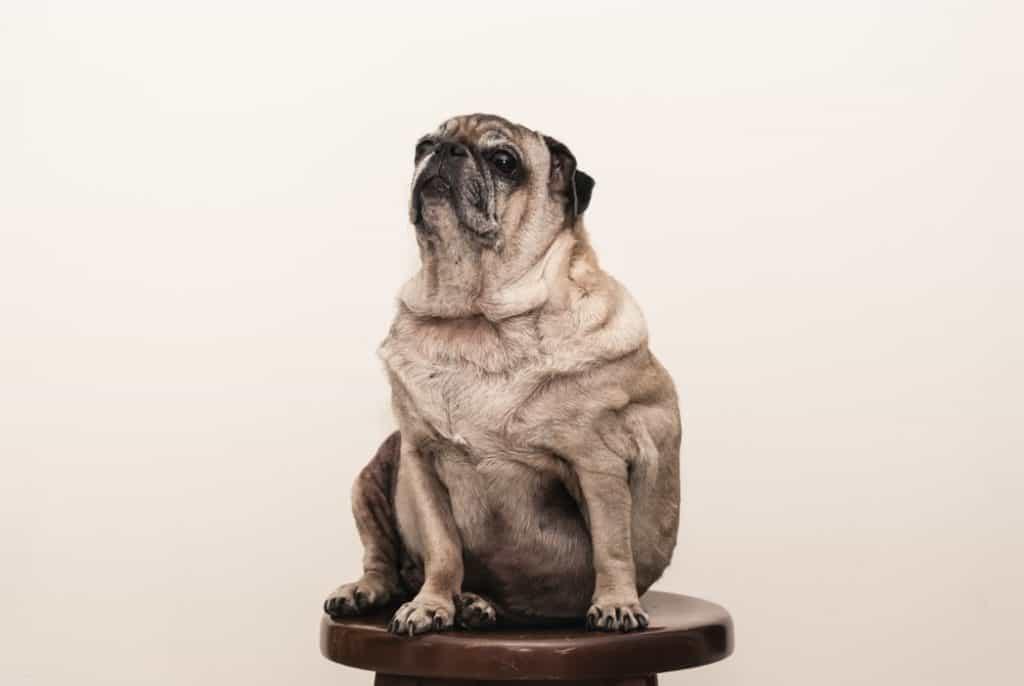More than half of cats and dogs are overweight or obese, and worldwide, pet-obesity rates range from 22% to as much as 44%. The latest numbers show that 60% of dogs are overweight, while 56% of cats are overweight.
Yet the internet seems to be captivated by plump or chubby pets, with a stream of memes, pictures, and videos showcasing how sweet, cute, and huggable these animals are because of their charming girth. Overweight cats who get stuck inside of things are played for laughs, and obese dogs regularly attract media attention and go viral.
Photo by Jorge Zapata on Unsplash
The Overweight Pet Epidemic
Human obesity and the overweight epidemic is mirrored in pets. As for humans, obesity in animal companions is linked to poor quality of life, shorter life spans, and serious health issues such as osteoarthritis, diabetes, cancer, and hypertension. Obesity also raises the risk of joint injuries, particularly in dog breeds prone to the elbow or hip dysplasia like Border Collies or German Shepherds, as well as liver and kidney diseases, and heart failure.
Issues such as hypothyroidism, neutering, and genetics can raise the risk of obesity, but overfeeding tends to be the biggest contributor. While awareness of the issue seems to be growing with initiatives such as pet-obesity awareness days, a complete cultural change hasn’t yet happened.
For example, Fat Fred, an overweight cat living at a vet clinic, went viral thanks to “hilarious” signs joking about his weight. Coverage and commentary of Fred’s 28-pound weight found his obesity amusing rather than concerning.
Similarly, lighthearted stories circulated about how Meow the adorable 39-pound cat ate hot dogs and was too big to fit into his carrier. This was despite the best intentions of the animal shelter to use the coverage to help him find an adoptive family. The super-obese cat was featured on TV shows as a point of curiosity rather than serious discussions about the pet obesity issue. Tragically, Meow eventually died of lung failure.
Sampson, the 187-pound labrador, was the subject of humorous coverage about him enjoying too much leftover pizza, pasta, and scraps from roasts. The obese dog was unable to exercise properly or to enter his doghouse, and he had bulging and bloodshot eyes due to high blood pressure. Fortunately, Samson was adopted by the Animal Aid shelter, which put him on a strict diet in preparation for adopting him out to a new owner.
Social media adding fuel to the fire
Social media platforms feature tags or collections such as “morbidly obese animals” with photos of overweight animals and text commentary intended to be funny. Fat cat and fat dog videos log millions of views online, and these lighthearted videos are designed to amuse rather than raise awareness of the issue.
On Instagram accounts such as Chonky Animals, Round Boys, and Round Animals, accounts have hundreds of thousands of followers. Facebook group This Cat is Chonky features hundreds of new posts every day and has more than 395,000 members. The rules of the page specifically prohibit calling out owners for allowing their pets to become so unhealthy.
These stories and videos celebrate obesity in animals and are used as entertainment. Sharing and circulating these stories can create the perception that these animals are okay and obesity in a pet is desirable. What these viral narratives leave out is severely obese animals are just as unhealthy as starved, emaciated pets.
Pet owners today treat their pets as a member of the family and even travel with and sleep in the same bed as their pets. As such, there’s the temptation to overfeed and indulge pets with too many treats and scraps from the table.
A cultural shift needs to take place
Veterinarians might also have an important role to play. Research suggests 80% of vets and 68% of owners have tried to help pets lose weight through more exercise, smaller portions, low-fat pet food, and/or prescription pet food. So while vets and owners are making an effort to help their overweight pets, the viral stories about “chonky” pets focusing on their cuteness rather than unhealthy weight suggest a cultural shift still needs to take place.
Overfeeding a pet can be as dangerous as underfeeding which leads to malnourishment, but the online culture of “cute,” chonky animal stories ignores this. The obese animal stories affirm it’s okay for an animal to be overweight and may normalize overfeeding.
Along with making a cultural shift, the pet-owning community should look to their vets for help if they have overweight animals. Vets should encourage owners to help their pets lose weight, whether by restricting caloric intake, carefully monitoring what they’re putting into homemade pet food, exercising more, or all three. The pet-food industry can also help by including better labeling to assist owners with improved portion control.
There are some positive trends taking place. There is now a pet obesity awareness month which is held every October, with the goal of promoting awareness of pet obesity. There is also a national pet obesity awareness day which is on October 15th.
